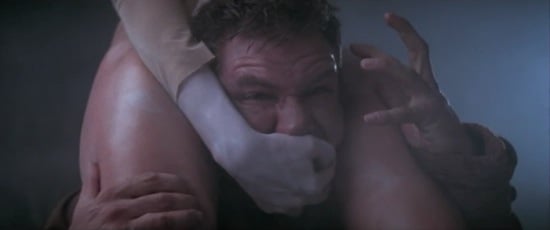Shocking Blocking (28)
By:
January 6, 2012

If Ridley Scott’s Blade Runner is celebrated for its Moebius-inspired design, I say that’s as it should be. And if some give the movie credit for “literacy,” by reading into it references (e.g., Anderssen and Kieseritzky’s Immortal Game of chess) that aren’t there, that’s OK with me, too — because it’s plenty literate, indeed. Some complain that Blade Runner eliminated key plot elements from Philip K. Dick‘s Do Androids Dream of Electric Sheep? (e.g., the Mercerism cult, not to mention electric sheep), but I say the movie communicates Dick’s themes without ’em. However, I object to the absence, in Blade Runner, of the phildickian suggestion that the android-hunting protagonist might himself be an android. You argue: “In the movie, Deckard’s apartment is cluttered with photos in which he doesn’t appear; in some versions, he has a false memory of a unicorn; he’s a cold fish!” True, but that’s subtle. Viewers never really question Deckard’s humanity… except, perhaps, when prompted by the blocking in this scene. The sexy replicant Pris (Daryl Hannah) is crushing Deckard (Harrison Ford)’s skull between her thighs. Yet he struggles — why? No authentically human heterosexual male could possibly object to such a death!
An occasional series analyzing some of the author’s favorite moments in the positioning or movement of actors in a movie.
THIRTIES (1934–1943): It Happened One Night (1934) | The Man Who Knew Too Much (1934) | The Guv’nor (1935) | The 39 Steps (1935) | Young and Innocent (1937) | The Lady Vanishes (1938) | Mr. Smith Goes to Washington (1939) | The Big Sleep (1939) | The Little Princess (1939) | Gone With the Wind (1939) | His Girl Friday (1940)
FORTIES (1944–1953): The Diary of a Chambermaid (1946) | The Asphalt Jungle (1950) | The African Queen (1951)
FIFTIES (1954–1963): A Bucket of Blood (1959) | Beach Party (1963)
SIXTIES (1964–1973): For Those Who Think Young (1964) | Thunderball (1965) | Clambake (1967) | Bonnie and Clyde (1967) | Madigan (1968) | Wild in the Streets (1968) | Barbarella (1968) | Harold and Maude (1971) | The Mack (1973) | The Long Goodbye (1973)
SEVENTIES (1974–1983): Les Valseuses (1974) | Eraserhead (1976) | The Bad News Bears (1976) | Breaking Away (1979) | Rock’n’Roll High School (1979) | Escape from Alcatraz (1979) | Apocalypse Now (1979) | Caddyshack (1980) | Stripes (1981) | Blade Runner (1982) | Tender Mercies (1983) | Monty Python’s The Meaning of Life (1983)
EIGHTIES (1984–1993): Repo Man (1984) | Buckaroo Banzai (1984) | Raising Arizona (1987) | RoboCop (1987) | Goodfellas (1990) | Candyman (1992) | Dazed and Confused (1993) |
NINETIES (1994–2003): Pulp Fiction (1994) | The Fifth Element (1997)
OUGHTS (2004–13): Nacho Libre (2006) | District 9 (2009)
Joshua Glenn’s books include UNBORED: THE ESSENTIAL FIELD GUIDE TO SERIOUS FUN (with Elizabeth Foy Larsen); and SIGNIFICANT OBJECTS: 100 EXTRAORDINARY STORIES ABOUT ORDINARY THINGS (with Rob Walker).
